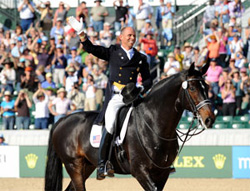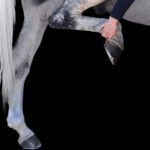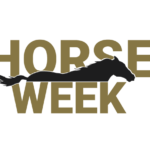[/caption]

Sept. 8, 2010 — I had a unique chance to go behind the scenes during a four-in-hand driving team “mandatory outing” at Tucker Johnson’s scenic Cedar Lane Farm in Oldwick, N.J., last week.
The top five among the 10 U.S. drivers who will be competing at the Alltech FEI World Equestrian Games worked with coaches Michael Freund and Peter Tischer to polish their performances, getting more assistance along the way from judge Johan Lange, U.S. Equestrian Federation Director of Driving Lizzy Staller and chef d’equipe Ed Young.
Top-ranked are Tucker Johnson, Chester Weber and Jimmy Fairclough, the likely U.S. squad (in driving, two out of three count for a team score). They were a foregone conclusion even before the training session, which really was an observation opportunity to monitor candidates’ progress as they got help that could mean the difference between no medal and a medal at the WEG, or perhaps a difference in what color medal they do get.
“They have a big chance of coming very good out there (at the WEG) I think so and I hope so,” Johan told me. A native of Germany who lives in Spain and donated his time for the outing, the judge felt the U.S. could have an edge because “it’s much easier for the horses” with no stressful shipping and quarantine, which the European-based horses have to go through.
Conditions at the outing were meant to simulate the competition part of the WEG experience, though the marathon had only five hazards as compared to eight, but drivers had to make the time on the very important walk section, which is a key to avoiding penalties. When necessary, they went through some hazards twice at the coaches’ direction, and they had to pass a veterinary jog, as they will at the WEG.
“They wanted this to be a little bit stressful,” Lizzy explained. “They are paying attention to scores. They take it seriously.”
It was the perfect location for the outing. After all, how many private farms have top-class hazards, along with interesting terrain over great footing? Those who think New Jersey is just the Turnpike should take a drive out to horsey Hunterdon County and Tucker’s neighborhood to see why its nickname is the Garden State.
National Champion Chester Weber, who alone among the top three did not compete in Europe this year, considered the outing important.
Chester is considered by those in the know a candidate for an individual medal, and his 35.84 penalty dressage score at the outing is indicative of that. He already has earned an individual silver at the world championships and is eyeing the gold, though he’ll have serious rivals for that, including two-time Aachen winner Boyd Exell of Australia and the Netherlands’ IJsbrand Chardon, winner of four individual world championships and the reigning titleist. In fact, the top 11 drivers in the world will contest the WEG. The only one who’s missing is Hungary’s Zoltan Lazar, who just won the Breda event in Holland.
The Hungarian driving team isn’t coming to the WEG and neither are the British, citing the cost. The Europeans are very spoiled because the major competitions usually are located close to them. But since it costs $200,000 to transport multiple horses and carriages for one competitor, it’s understandable to a certain extent why some might stay home. On the other hand, every time the Americans go to Europe to compete, it costs us the same! But with the steep price tag, I’m not expecting to see another international four-in-hand event of this caliber in the U.S. again during the foreseeable future. So the WEG will be a once-in-a-lifetime event as far as the four-in-hands are concerned.
Tucker hasn’t driven much over the last year, but he did go to Aachen and Riesenbeck in Germany, where he was second. He’s the consummate thinking driver, even though he’s strictly an amateur who doesn’t have much time to devote to the sport anymore. Once he got into the swing of things during the outing, though, he breezed through the hazards with finesse.

Every time you drive a horse, you gain a new insight, so I was wondering what this veteran discovered on his home turf.
The WEG is going to be Tucker’s last competition. He hopes to break below 40 penalties in dressage there (he came close at the outing, just two penalties and change away from his goal with a 42.4) and you know he’ll be strong on the marathon. As for the third phase; well, they didn’t call him, “The King of Cones” for nothing. He was the only driver who had a double clear in cones on his first try at the outing, coming in as the leader after the marathon. That made him the “winner” of the session, though of course, they weren’t giving out ribbons.
It will be nice for him to bow out on a high note, and it’s a real possibility. The squad of Tucker, Jimmy and Chester won a team silver at the 2002 WEG and they could do it again. The Dutch, of course, will be hard to beat with Chardon and other strong drivers, and the Germans are likely to prove a threat as well.

Jimmy, who is sponsored by U.S. Equestrian Team Foundation President Jane Clark, contends the horses he has right now are his best team in 32 years of competing internationally. I have a feeling that his dressage score of 49.6 from the outing can be improved upon at the WEG. He felt the training session was valuable, and you can bet he’ll be carrying its lessons to Kentucky.
The only big question about the top five, which likely won’t be answered until next week, is who will be the first alternate. I should explain here that 10 American drivers will be competing at the WEG, the opportunity of a lifetime coming because of lighter than usual entries in the discipline. I already explained the reason.
Four of the other drivers on the list; veteran Bill Long, who also will retire from competition after the WEG; Gary Stover, Cindy Jo O’Reilly and Casey Zubek had their outing in North Carolina before the New Jersey session. Mike McLennan, ranked number six, did not attend but was checked by Peter Tischer to monitor his progress.
In the Aug. 3 rankings, newcomer Josh Rector of Arizona was number four. He has done a lot of work with Chester, who has taken him under his wing as he looks toward the future of American driving post-WEG. Michael Freund’s brother, Fred, also works with Josh. The Arizonan and his horses are still a work in progress with a 54.50 in dressage at the outing. Experience counts for so much in combined driving, and he has a lot of that to gain, but this friendly guy displays a go-for-it attitude.

David Saunders, ranked number five, has a weak spot in dressage with a score of 65.60 penalties at the outing. But he’s a real pro in the marathon and cones. He was present at the creation of combined driving when he served as head coachman to Prince Philip of Great Britain, founder of the sport, and has represented his homeland in world championships.
Now an American citizen, he is the only competitor driving American horses, Alan Aulson’s team of black Morgans. While Morgans are smaller and finer than the European horses usually seen in high-level combined driving, David emphasizes they can do the job. Remember the all-important walk phase of the marathon? At the outing, his horses came in 11 seconds under the optimum time.
“Everyone said to me they wouldn’t be able to pull a marathon carriage,” David said, recalling people’s comments when he started with the Morgans 18 months ago.
“It’s a challenge, you just have to train for it and work hard at it.”
David, who is one of the trainers at the Black Prong equestrian center in Florida, is doing the WEG on a shoestring. A recent sponsorship from the Cavalor feed company helps (an interesting irony here: the European horses on the roster are sponsored by American feed companies; the Morgans, the only American horses, are sponsored by a European company.)

David learned a lot in his younger days from Queen Elizabeth’s former head coachman, Arthur Schowell, whose solution to every question about how to do this or that with driving horses was “drive them 20 miles.”
“He was right in a way, you need to drive driving horses, you need to work them,” David said.
“I don’t have some sort of secret weapon. You just need to make sure you feed the horse well and you work the horse well.”
David’s last competitive outing was in June at Bromont, Canada, where he came in third overall and second in the marathon, beating Chester in two hazards there.
“The Morgan horse is the working man’s horse and I’m the working man,” said David, noting “we should have an American-bred horse at the WEG.”
He compares Morgans’ attitude to that of Welsh cobs.
“You don’t bully a pony into doing anything. You have to ask it nicely,” he said.
The Cinderella story in his team is Sox, who was a broodmare for seven years. Alan was going to give her away, but David asked to try her out, and now she’s “the main marathon mare.”
“During my professional career, I’ve had to drive whatever has been given to me,” he said of the mileage that has stood him in good stead.
He is not being paid to drive the competition horses and has only one groom to help him. He uses his own carriages, while Alan pays for the transportation and the groom’s salary. David funded himself by selling two horses.
“I’m down to about $3,000 of that, so I should just about make it to the WEG,” said David, who drove in the first WEG 20 years ago in Stockholm, where he finished 24th. It’s possible the WEG exposure will boost his training business; at least, he hopes so.
David is outspoken and funny. He calls Chester, Tucker and Jimmy, “the glory boys,” noting they have the best horses and deserve to be the team.
Although David is 58, unlike Tucker and Bill, he has no plans to retire after the WEG.
“This job is not about young and old. We’re not the athletes,” he said. “I’ve got another 10 years in me competing.”
After attending the outing, I can’t wait to watch the driving at the WEG, though we’ll have to wait until October for that because it’s in the last group of competitions. If you can make it to the WEG, I’ll see you there; otherwise, I’ll keep you filled in.





